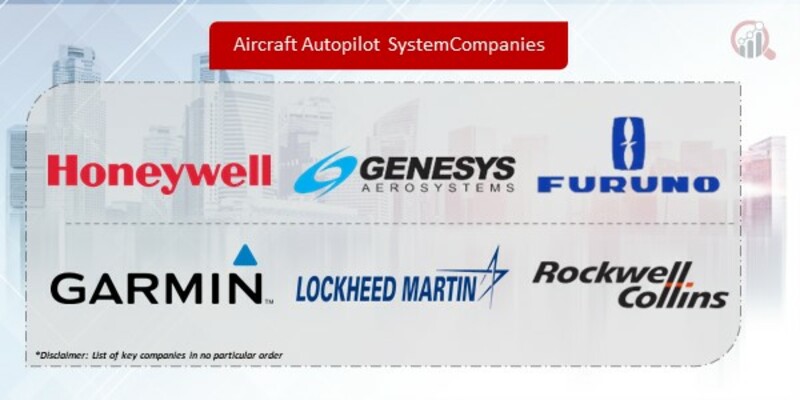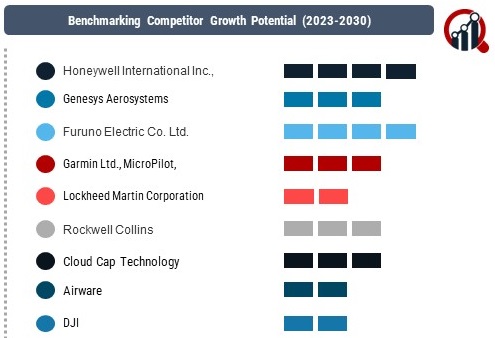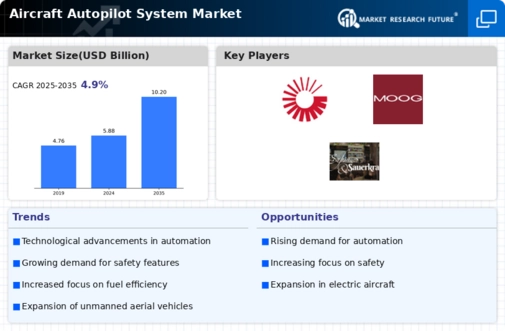Top Industry Leaders in the Aircraft Autopilot System Market

Key players :
Honeywell International Inc.,
Genesys Aerosystems,
Furuno Electric Co. Ltd.
Garmin Ltd., MicroPilot,
Lockheed Martin Corporation,
Rockwell Collins
Cloud Cap Technology
Airware
DJI
Strategies Adopted
Leading the pack in the aircraft autopilot system market is Honeywell International Inc., a global conglomerate known for its aerospace solutions. Honeywell has maintained its dominance through a comprehensive product portfolio and a focus on research and development. Their strategies revolve around the integration of artificial intelligence and machine learning into autopilot systems, enhancing navigation precision and overall flight safety. Collaborative ventures with major aircraft manufacturers further solidify Honeywell's position in the market.
Rockwell Collins, now part of Raytheon Technologies Corporation, is another major player in the aircraft autopilot system sector. Their approach to maintaining competitiveness involves the continuous refinement of existing technologies and the development of integrated avionics solutions. By addressing the demand for seamless cockpit integration, Rockwell Collins aims to offer comprehensive autopilot systems that enhance operational efficiency and reduce pilot workload.
Garmin Ltd. is a key player that has gained prominence by offering advanced avionics solutions, including autopilot systems, for both fixed-wing and rotorcraft applications. Garmin's competitive strategy involves a strong focus on user-friendly interfaces and the integration of cutting-edge technologies such as GPS and inertial navigation systems. This has allowed the company to cater to a diverse range of aircraft, from small general aviation planes to larger commercial airliners.
Emerging Companies
As the aircraft autopilot system market continues to grow, new and emerging players are making their mark. Avidyne Corporation, for instance, has carved a niche by providing autopilot systems with a focus on situational awareness and ease of use. Their strategies involve targeting niche markets and collaborating with regional aircraft manufacturers to expand their market presence.
In the pursuit of market share, companies are increasingly investing in research and development to introduce innovative features and improve the overall performance of autopilot systems. Factors for market share analysis include the ability to offer cost-effective solutions, regulatory compliance, and adaptability to various aircraft types. The integration of advanced sensors, adaptive control algorithms, and real-time data processing capabilities are crucial elements that contribute to the competitive advantage of autopilot system providers.
Industry news reflects the ongoing trends and developments shaping the competitive landscape of the aircraft autopilot system market. For instance, the increasing emphasis on autonomous flight capabilities and the integration of Artificial Intelligence (AI) for decision-making processes are key focal points. Companies are investing in AI technologies to enhance autopilot systems' ability to adapt to diverse and dynamic flight conditions, ultimately improving aircraft safety and performance.
Recent News
Honeywell International:
January 2024: Unveiled the Primus Apex NextGen suite, an advanced autopilot system with AI-powered features for improved flight predictability and enhanced automation.
December 2023: Successfully integrated their SmartPath autonomous landing system on a regional jet, paving the way for wider adoption in commercial aviation.
October 2023: Announced a partnership with Garmin to develop a joint autopilot system solution for light aircraft and eVTOLs.
Garmin Ltd.:
January 2024: Announced the GFC 650 autopilot system for the Cirrus Vision Jet SF512, further expanding their presence in the business jet market.
December 2023: Launched the Garmin Autoland system for helicopters, enabling automatic landings even in low-visibility conditions.
October 2023: Unveiled the G1000 NXi avionics suite with integrated autopilot features for turboprop aircraft.


